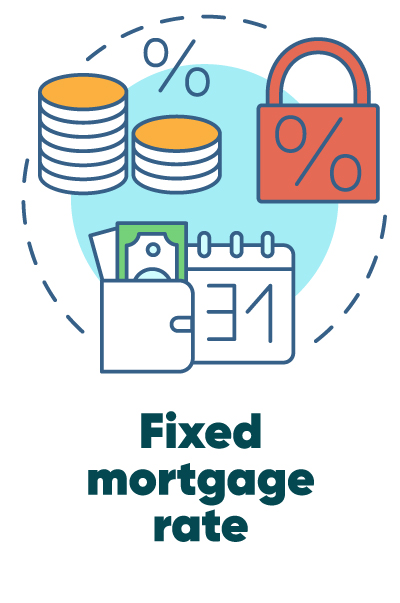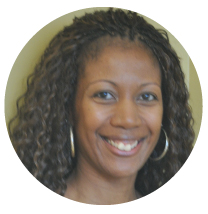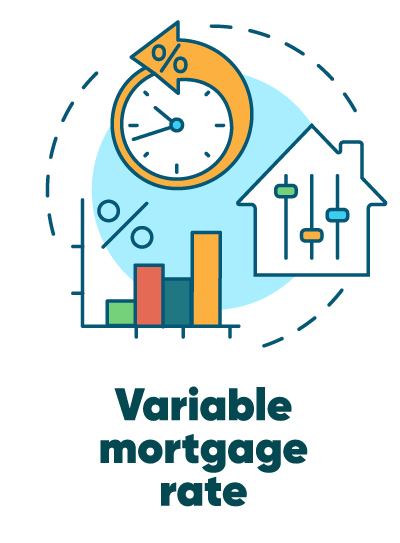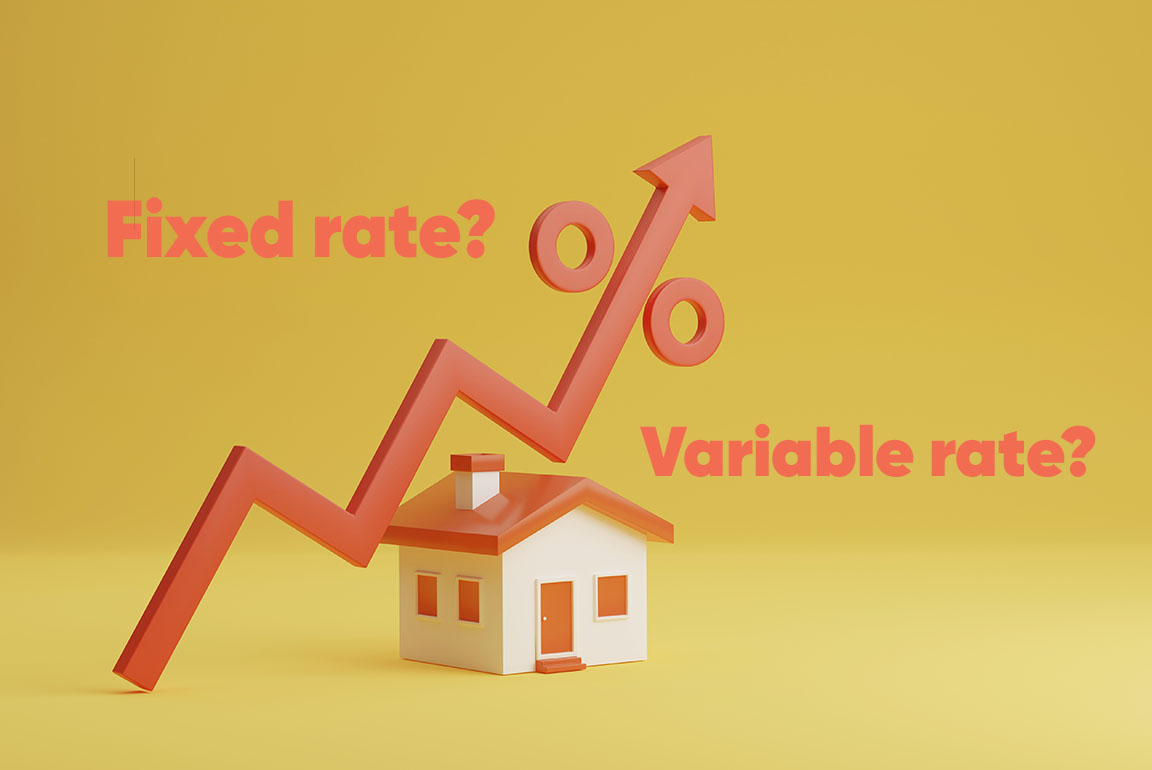Posted: August 13, 2024 by Helen Burnett-Nichols in Borrow, Money tips, fixed mortgage rate, variable mortgage rate
Variable vs. fixed rate mortgages: Everything you need to know
When choosing a mortgage, comparing fixed vs variable rate mortgages has become a tough task in an era of fluctuating interest rates.
Interest rates rise and fall, sometimes to extreme levels like the low ones we saw from mid-2020 until 2022—for a decade and a half, in fact, interest rates had been low. Many Canadians who bought their first home or renewed a mortgage chose a variable rate, with this option making up more than half of mortgages in Canada at one point last year.

Inevitably, though, rates climb back up, as described in this data from the Canada Mortgage and Housing Corporation (CMHC). When that happens, borrowers tend to seek fixed rate options.
So, in an uncertain economic environment, is there a clear-cut mortgage choice between fixed and variable rates for homebuyers?
Weighing options: fixed vs. variable mortgage rate
Glenda Bahalla, Financial Advisor at ACU’s Regent branch, explains it’s important to put today’s rates into perspective. The rate is only one part of your overall plan when deciding on a type of mortgage.

The coming 25 years are not going to be like this,” she explains. “There are times the rate may go up, but it’s only two years of your mortgage life.
Ultimately, deciding whether a fixed or variable rate mortgage is right for you – and even the type of fixed or variable mortgage – depends on your individual circumstances. This can include factors such as your risk tolerance, future moving plans and overall budget.

How much mortgage can I afford?
6 mortgage tips for first-time homebuyers
Before you make a choice, it’s a good idea to take a closer look at some of the benefits, drawbacks and considerations of fixed and variable-rate mortgages.
The basics of a fixed mortgage rate

With a fixed mortgage rate, the rate you agree on is locked in for the term of your mortgage. Your payments will stay the same, regardless of whether interest rates rise or fall.
This is a positive for members looking for certainty when it comes to their mortgage payment each month. The downside? You won’t be able to take advantage of rate decreases if they occur during your mortgage term.

“A fixed mortgage rate is stable for the entire term. It’s predictable,” says Marsharee Lindsay, Financial Advisor with ACU’s Pembina branch. “There are a lot of members who appreciate budgeting for the same amount every month. That peace of mind can be valuable.”
When rates are moving lower, a shorter-term fixed mortgage such as two or three years may make sense, as you’ll get the certainty of a fixed rate and payment during your mortgage term. At the same time, you also get the benefit of renewing at a lower rate sooner rather than later, without breaking your mortgage.
The basics of a variable mortgage rate

When you choose a variable mortgage rate, your interest rate is less predictable, as it goes up or down depending on your lender’s prime rate (which is ultimately influenced by the Bank of Canada’s policy interest rate). A variable rate is determined by the prime rate, plus or minus a certain percentage, and this relationship will stay consistent throughout your term.
The rate of interest you pay has the potential to change several times during the mortgage term. For homeowners who select this option, they may face a tighter budget when rates increase. Conversely, it can be helpful when rates decline and their mortgage amount in those months is not as costly.
“Ask yourself how you react to rising inflation and fluctuating rates. How do you cope emotionally? Would it drastically affect your day-to-day life? If you’re worried about the impacts of a variable rate, it may not be the best option,” says Glenda.
Variable-rate mortgages come in two types: fixed payment and variable payment.
Fixed payment mortgages have monthly payments set at a fixed amount for the entire term of the loan. You will pay the same each month, regardless of the changes in interest rate. If interest rates rise, more of that fixed payment will go to the interest portion. If rates fall, more of your payment will go toward your principal.
Variable payments change based on the interest rate. If interest rates rise, your payment will increase; if rates fall, your payment will decrease. The percentage going toward the principal will likely remain constant. In this case, you will need some leeway in your budget for those periods when payments might be higher.
Many variable-rate mortgages come with the option to lock into a fixed rate at any time.
For example, if rates are moving higher, switching your mortgage from variable to fixed may make your payments more affordable. At the same time, it’s important to be aware that by locking into a fixed rate, you’ll lose the ability to benefit from any potential lower rates until you renew.
The flexibility factor: Open vs. closed terms
Beyond the question of a fixed vs. variable mortgage rate, consider whether you’d like the ability to pay off part or all of your mortgage before the end of your term. That’s where open and closed term mortgages come into play.
This could be an important point if you anticipate receiving lump sums such as tax refunds, commission payments, bonuses, additional property sales or an inheritance.
Open-term mortgages are flexible and are generally offered at higher interest rates than their closed counterparts. They allow members to make additional payments or repay the mortgage in full at any point during the term, without facing any penalties.
With a closed-term mortgage, you will likely benefit from a lower rate, but the repayment terms are more restrictive. With this option, you’ll likely face penalties if you want to repay your mortgage in full before the end of your term, refinance to take advantage of a lower rate or break your mortgage contract.
Fixed vs. variable mortgage rate—how do I decide which is best?

Every borrower is different. When applying for a mortgage, your ACU mortgage specialist will look at all current options for fixed and variable mortgage rates. This includes ACU’s fixed closed mortgage terms of six months up to five years.
To further help, ACU mortgage specialists can run custom calculations to find out what your mortgage payments will look like—as well as how much you’ll pay towards your principal and interest. Calculations will depend on factors such as:
? the rate and term
? the amortization period
? the frequency of your payments
? the amount of your down payment
First home?
Maximizing your First Home Savings Account is another way to help achieve your home ownership goals. Benefit from tax-deductible contributions of up to $8,000 a year, as well as tax-free investment growth and withdrawals when you purchase your first home. You also won’t have to ‘pay back’ any funds you withdraw.
Combined with your current financial situation and future plans, your mortgage specialist can then recommend the most cost-effective options.
We are going to look at the situation holistically. We’re not going to try to fit you into a box based on one or two questions,” says Marsharee. “Members have different comfort levels and needs, and we want to make sure whatever you choose is going to be best suited to you and your situation.
Still wondering whether a fixed or variable mortgage is best for you? Ask yourself these questions:
- Are you planning on selling your home in the next year or two?
- Do you have room in your budget to handle interest rate increases in the short-term?
- Are you okay with your mortgage payment changing over the course of your mortgage term?
- Do you plan to pay off part or all of your mortgage in the near future?
If you’re ready to explore mortgage options tailored to your budget, goals and plans, talk to an ACU mortgage specialist today to get started.
Up Next
Community stories
Read more ›
Celebrating the 10th anniversary of student-run credit union
Just over 10 years ago, a survey circulated at Winnipeg’s Technical Vocational High School. The results showed that students at the school, commonly known as Tec Voc, felt short-changed—they were…
Borrow, Business growth, Community stories
Read more ›
Kilter Brewing Co. serves up craft beer and community connection in St. Boniface
Deep in the heart of St. Boniface, Kilter Brewing Company is a hidden treasure—an oasis for Winnipeggers to escape their day-to-day routines, enjoy craft beer and connect with their community….
Borrow, General, Money tips
Read more ›
How to use a mortgage calculator to budget better
Learn how to use ACU’s mortgage calculator to figure out how much mortgage you can afford, and what budget you should set before you start house hunting. A mortgage lender…






